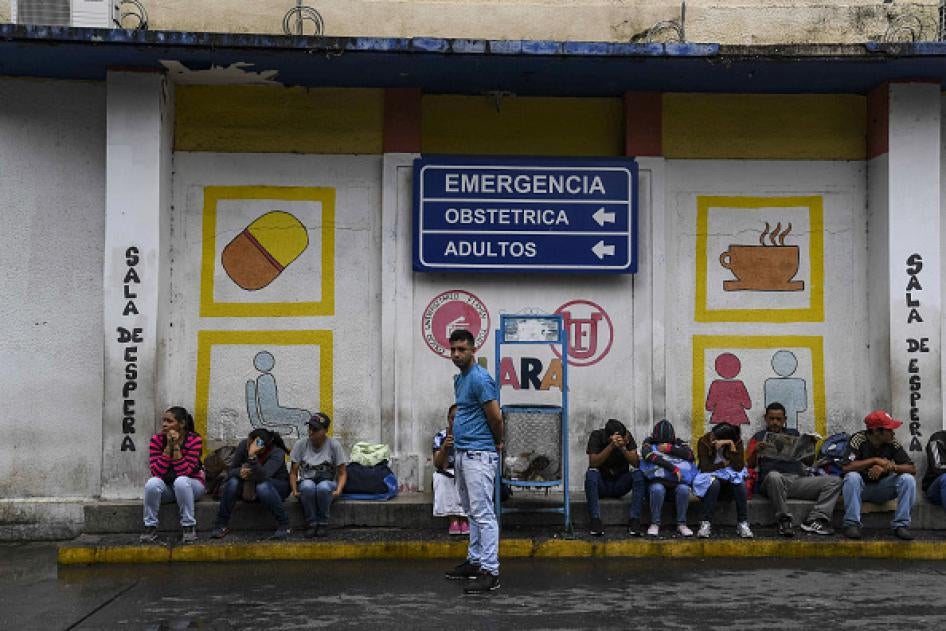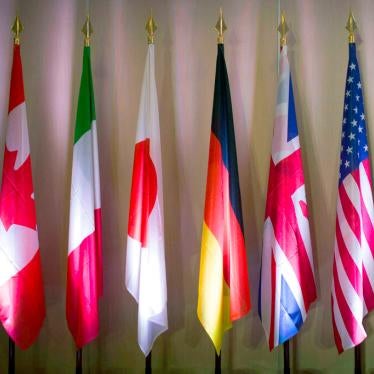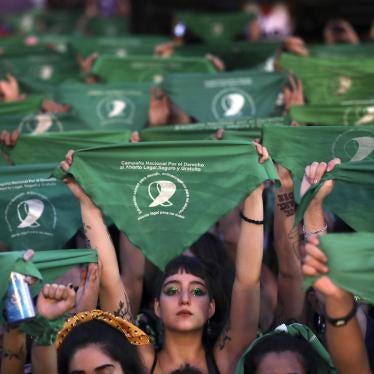By Kathleen Page and Tamara Taraciuk Broner
The coronavirus has quickly evolved from an epidemic in China’s Hubei province to a global pandemic. The question now isn’t which countries will get it, but how they will respond—and whether human rights will be protected. The World Bank and the United Nations have committed emergency funds to support the response, prioritizing countries with weak health systems. But that critical funding needs to be paired with political will, a sense of urgency, and transparency in the countries receiving aid.
In Venezuela, that vital political will is hard to imagine. The country’s health system is collapsing. Hospitals have closed or are operating at a fraction of their capacity, many without regular access to electricity or water. The public health infrastructure is so weak that in 2019, Venezuela had the world’s steepest rise in malaria cases. Vaccine-preventable diseases such as measles and diphtheria have already returned long before the epidemic hit.
The first COVID-19 case in South America was reported in Brazil on Feb. 26. Cases have since been confirmed in most countries in the region, but not in Venezuela. Given that Venezuela’s borders and airports remain open, this is surprising. It is difficult to know if there aren’t any cases or if Venezuelan health authorities are unable to cope with a possible outbreak. There were currently only 300 diagnostic tests available for a population of around 30 million, a local medical source said this week. Around 70 percent of Venezuela’s hospitals do not have tests.
Government actions that have contributed to Venezuela’s collapsing health care system not only violate Venezuelans’ right to health, but they are now a threat to global health. In the context of collapsing infrastructure, mass migration, and a government in denial about the humanitarian emergency, a coronavirus outbreak in Venezuela would be a disaster. It is imperative for the global community to prepare for this. Doing so requires governments, including the United States, to channel sufficient humanitarian aid through the United Nations.
What will happen when the coronavirus emerges in Venezuela? There are many reasons to worry, beginning with a lack of government transparency on health. Until 2014, Venezuela had a robust epidemiologic surveillance infrastructure that published regular morbidity and mortality reports. Then came two years of silence. The health minister, Antonieta Corporale, finally spoke up in 2016, publishing data showing that infant mortality had increased by 30 percent and maternal mortality by 65 percent. She was fired.
Since then, the government has not released any epidemiological reports. It’s not clear whether the data is being collected and suppressed or not collected at all. A critical first step in planning an adequate response to the coronavirus epidemic is identifying cases and sharing information with health officials and the public. The precedent set by the government of President Nicolás Maduro, which has been aggressively hostile toward the press and distrusts its own people, does not inspire confidence.
Venezuela’s health care infrastructure is so weak that the most basic recommendation—handwashing—is difficult even for health care providers, who work under difficult conditions. The Venezuelan doctors and nurses we have interviewed over the past few months say that soap and disinfectants are virtually nonexistent in their clinics and hospitals. As inflation has risen and salaries have been devalued, it has become impossible for them to bring in their own supplies. Public hospitals in Caracas, the capital, are also suffering regular water shortages. In remote hospitals, the shortages have lasted weeks to months. Patients and personnel are required to bring their own water for drinking and sometimes for flushing toilets.
Imagine what will happen to health workers and patients when COVID-19 emerges in Venezuela. Just one case in a hospital could lead to transmission within the system, putting already sick patients at risk. Around 3.4 percent of confirmed coronavirus patients have died, according to the World Health Organization. The death rate would likely be higher in Venezuela, where there is no capacity for complex care due to a lack of basic X-rays, laboratory tests, intensive care beds, and respirators.
Under such circumstances, it may be best for sick people to avoid hospitals altogether. Transmission in the community or in prisons, for example, could also happen quickly in the absence of basic public health protections. Infectious diseases thrive under the conditions of poverty, crowded living arrangements, and malnutrition that many Venezuelans face. Basic measures such as handwashing and social distancing will be difficult to implement in a country where water shortages are routine, supplies are expensive, and people struggle to find food.
A coronavirus outbreak in Venezuela would threaten the rest of Latin America. The crisis in Venezuela has led to the largest migration in the region in recent decades: More than 4.9 million Venezuelans have left the country, many taking with them diseases that had been eradicated. In 2016, the Pan American Health Organization declared the Americas the first region to eliminate measles. Yet vaccine shortages and the breakdown of health care in Venezuela led to a measles outbreak in 2018 that spread to 14 countries. The health systems of neighboring countries are already strained trying to meet the health needs of Venezuelan exiles. A coronavirus outbreak in Venezuela would only make things worse.
The global community needs to step in. For a long time, U.N. Secretary-General António Guterres was shamefully silent about Venezuela’s humanitarian emergency. In April 2019, he recognized for the first time that 7 million Venezuelans needed humanitarian assistance. So far, aid has reached only 2.4 million people, according to the United Nations Office for the Coordination of Humanitarian Affairs (OCHA)—partly due to insufficient funding, but also because it is logistically difficult to reach Venezuela’s interior.
In 2019, the agency’s Humanitarian Response Plan for Venezuela received around one-third of requested funds. From July through December last year, the plan targeted 3,719 health and education institutions but reached only 265, according to the OCHA’s latest situation report. The 2020 plan has yet to be funded. Countries hosting Venezuelan exiles, especially Colombia and Brazil, need humanitarian support from other countries to address the health needs of Venezuelans while protecting their citizens. This aid is indispensable to counter rising xenophobia in the region.
A key actor to ensure that the U.N. response to Venezuela’s crisis is fully funded is the United States. If the humanitarian aid that the U.S. government provides to Venezuela does not go through the United Nations, the perception will be that the Trump administration may be using it as a political tool to overthrow Maduro—particularly in light of the administration’s sanctions on Venezuela’s oil sector. The sanctions exclude transactions aimed at aid, but there is a risk that overcompliance by financial institutions, which fear the consequences of working with sanctioned entities, is undermining the ability for aid to reach the Venezuelan people.
Despite the legitimate concern that aid would be used by the Maduro regime to cling to power, the priority should be to save lives. But for aid to effectively reach people, the Maduro government must stop posturing and facilitate nationwide access for U.N.-led humanitarian response teams. Venezuelan authorities should release public health data to inform preparations for a coronavirus response and strengthen laboratory capacity so that COVID-19 can be diagnosed early. Protection for the elderly, who will be hit the hardest, and for health workers should be prioritized.
None of this will happen without sustained international pressure on the Maduro government, including targeted sanctions such as asset freezes and the cancellation of visas for top Venezuelan officials. There should also be a push for international accountability for crimes including torture, given the absolute lack of judicial independence in the country. International pressure has proven an effective tool to push the Maduro government to act in the past, including accepting more international aid, and it could now contribute to pushing the regime to address the coronavirus outbreak more seriously.
The whole world is on coronavirus alert. Preparing the response for Venezuela will require money, diplomacy, and a political will that has not yet materialized. Neglecting Venezuela leaves us all in greater danger.
**
Kathleen Page is an associate professor and medical doctor at Johns Hopkins University and Tamara Taraciuk Broner is Americas acting deputy director and covers Venezuela for Human Rights Watch.









